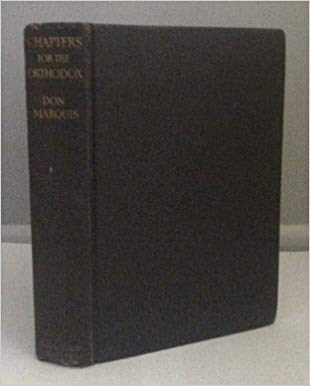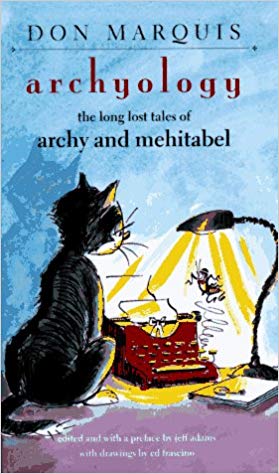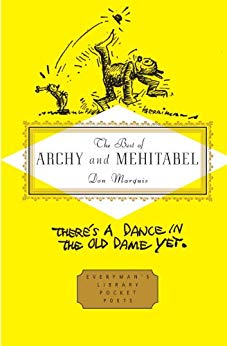Background
Donald Robert Perry Marquis was born on July 29, 1878, in Walnut, Illinois, United States to the family of a doctor James Stuart Marquis and Virginia Elizabeth Whitmore.

1900
Walnut, Illinois, United States
An early view of Don Marquis with friends in Walnut. Marquis is #5 on the far right side.
1912
New York City Public Library, New York City, New York, United States
Ellis Parker Butler, Reina Marquis (holding a copy of “Danny’s Own Story”) and Don Marquis.
1914
Portrait of author Don Marquis (Donald Robert Perry Marquis), taken sometime between 1910 to 1915.
1920
Don Marquis And his typewriter.
1925
Don Marquis walks with a cane as he crosses a street, the 1920s.
1925
Don Marquis smokes a cigar as he plays a game of pool, the 1920s.
Walnut High School, Walnut, Illinois, United States
Don Marquis attended Walnut High School from where he graduated in 1894.
Knox College, Galesburg, Illinois, United States
Don Marquis attended Knox Academy, a now-defunct preparatory program run by Knox College, in 1896 but after three months, he left the institution.
Corcoran School of the Arts and Design, Washington, District of Columbia, United States
Don Marquis studied at Corcoran School of the Arts and Design in 1899-1900.













(This book was originally published prior to 1923 and repr...)
This book was originally published prior to 1923 and represents a reproduction of an important historical work, maintaining the same format as the original work. While some publishers have opted to apply OCR (optical character recognition) technology to the process, we believe this leads to sub-optimal results (frequent typographical errors, strange characters, and confusing formatting) and does not adequately preserve the historical character of the original artifact. We believe this work is culturally important in its original archival form. While we strive to adequately clean and digitally enhance the original work, there are occasionally instances where imperfections such as blurred or missing pages, poor pictures or errant marks may have been introduced due to either the quality of the original work or the scanning process itself. Despite these occasional imperfections, we have brought it back into print as part of our ongoing global book preservation commitment, providing customers with access to the best possible historical reprints. We appreciate your understanding of these occasional imperfections, and sincerely hope you enjoy seeing the book in a format as close as possible to that intended by the original publisher.
https://www.amazon.com/gp/product/B009E6UYVQ/?tag=2022091-20
1916

(From his hut in the tree-top Probably Arboreal looked laz...)
From his hut in the tree-top Probably Arboreal looked lazily down a broad vista, still strewn with fallen timber as the result of a whirlwind that had once played havoc in that part of the forest, toward the sea. Beyond the beach of hard white sand the water lay blue and vast and scarcely ruffled by the light morning wind. All the world and his wife were out fishing this fine day. Probably Arboreal could see dozens of people from where he crouched, splashing in the water or moving about the beach; and even hear their cries borne faintly to him on the breeze. They fished, for the most part, with their hands; and when one caught a fish it was his custom to eat it where he caught it, standing in the sea. In Probably Arboreal's circle, one often bathed and breakfasted simultaneously; if a shark or saurian were too quick for one, one sometimes was breakfasted upon as one bathed.
https://www.amazon.com/gp/product/B07K39N692/?tag=2022091-20
1922

(This beloved illustrated classic tells the tale of Archy,...)
This beloved illustrated classic tells the tale of Archy, a philosophical cockroach, and Mehitabel, a cat in her ninth life. Generations of readers have delighted in the work of the great American humorist Don Marquis. Marquis's satirical free-verse poems, which first appeared in his New York newspaper columns in 1916, revolve around the escapades of Archy, a philosophical cockroach who was a poet in a previous life, and Mehitabel, a streetwise alley cat who was once Cleopatra. Reincarnated as the lowest creatures on the social scale, they prowl the rowdy streets of New York City in between the world wars, and Archy records their experiences and observations on the boss's typewriter late at night. First published in 1927, Archy and Mehitabel has become a celebrated part of the twentieth-century American literary canon.
https://www.amazon.com/gp/product/B009QJMY5U/?tag=2022091-20
1927

(A collection of short-stories from Marquis, American news...)
A collection of short-stories from Marquis, American newspaperman and humorist, who was an uninhibited enemy of prohibition. Marquis's most memorable writings are his stories and verses about Archy and Mehitabel.
https://www.amazon.com/gp/product/B00085VWU4/?tag=2022091-20
1928

(Tales of mysteries and miracles performed in an off-hand ...)
Tales of mysteries and miracles performed in an off-hand way by Jesus and Satan and sometimes Jehovah himself on their incognito visits to New York.
https://www.amazon.com/gp/product/B0006D6LV8/?tag=2022091-20
1934

(Of all the literary genres, humor has the shortest shelf ...)
Of all the literary genres, humor has the shortest shelf life - except for Archy and Mehitabel, that is. First published in 1916, it is a classic of American literature. Archy is a cockroach, inside whom resides the soul of a free-verse poet; he communicates with Don Marquis by leaping upon the keys of the columnist's typewriter. In poems of varying length, Archy pithily describes his wee world, the main fixture of which is Mehitabel, a devil-may-care alley cat.
https://www.amazon.com/gp/product/B00CGI3H0O/?tag=2022091-20
1940

(A whimsical and sophisticated sage, archy the cockroach e...)
A whimsical and sophisticated sage, archy the cockroach entertained readers with iconoclastic observations on pretensions, politics, and our place in the cosmos during Marquis' career as a New York newspaper columnist in the 1920s and 30s. Allegedly tapping out stories at night by leaping from key to key on Marquis' typewriter, archy couldn't quite manage the shift key for capital letters. Although his tales appeared in lower case, his views achieved a level grand enough to solidify Marquis' reputation as an American humorist in the tradition of Mark Twain, Joel Chandler Harris, and Ring Lardner. archyology brings together selected "lost" tales that were literally rescued from oblivion by Jeff Adams, who found them among papers stored in a steamer trunk since Marquis' death. And so archy emerges from his long silence. Whether reporting on characters like emmet the ghost, sailing to Paris to visit the insects of Europe, being trapped for days in a New York subway train, or hanging out in a Long Island orchard enjoying fermented cherries, archy is always both provocative and inimitable.
https://www.amazon.com/gp/product/0874517451/?tag=2022091-20
1996

(In this second and final volume “composed” by archy, the ...)
In this second and final volume “composed” by archy, the literary cockroach, the wonderfully whimsical insect and his fractious feline friend, mehitabel, engage in misadventures large and small and comment with quirky accuracy on the common state of humanity. Previously unpublished in book form and literally recovered from a steamer trunk by editor Jeff Adams, these stories are the product of Don Marquis, a New York columnist and raconteur who was one of America's most popular humorists during the early twentieth century. archy supposedly worked at Marquis’s newsroom typewriter at night, diving headfirst onto individual keys to tap out columns; unable to use the shift key, of course, archy settled for lower-case letters and dispensed with punctuation entirely. Ungrammatical as they may be, archy's wry insights are a true delight, for, as he puts it, “one advantage of being a cockroach is that i see things from the under side.”
https://www.amazon.com/gp/product/0874518539/?tag=2022091-20
1998

(A selection of the best of the hilarious free-verse poems...)
A selection of the best of the hilarious free-verse poems by the irreverent cockroach poet Archy and his alley-cat pal Mehitabel. Don Marquis’s famous fictional insect appeared in his newspaper columns from 1916 into the 1930s, and he has delighted generations of readers ever since. A poet in a former life, Archy was reincarnated as a bug who expresses himself by diving headfirst onto a typewriter. His sidekick Mehitabel is a streetwise feline who claims to have been Cleopatra in a previous life. As E. B. White wrote in his now-classic introduction, the Archy poems “contain cosmic reverberations along with high comedy” and have “the jewel-like perfection of poetry.” Adorned with George Herriman’s whimsical illustrations and including White’s introduction, our Pocket Poets selection - the only hardcover Archy and Mehitabel in print - is a beautiful volume, and perfectly sized for its tiny hero.
https://www.amazon.com/gp/product/B009UAO2HI/?tag=2022091-20
2012
Donald Robert Perry Marquis was born on July 29, 1878, in Walnut, Illinois, United States to the family of a doctor James Stuart Marquis and Virginia Elizabeth Whitmore.
Don Marquis attended Walnut High School from where he graduated in 1894. Thereafter he attended Knox Academy, a now-defunct preparatory program run by Knox College, in 1896 but after three months, he left the institution. He also studied at Corcoran School of the Arts and Design in 1899-1900.
Don Marquis started his newspaper career with setting type and writing columns for small-town weeklies. For a brief period, he worked as a reporter in Washington, D.C., and Philadelphia. From 1902 to 1907, he worked on the editorial board of the Atlanta Journal and contributed a number of editorials. In 1907, he took a job with Joel Chandler Harris as an associate editor of the New Uncle Remus’s Magazine. He got nationwide recognition for his work in this magazine. In 1909, Marquis shifted to New York where he worked for several newspapers. In 1912, he served for “The Evening Sun”, a New York-based newspaper. For the next eleven years, he edited a daily column “The Sun Dial”. After leaving “The Evening Sun”, he joined “New York Tribune” which was later renamed as the “New York Herald Tribune”. He got recognition for his daily column “The Tower” published in this paper. Within a few months, the name of the column was changed to “The Lantern”. Initially, Marquis enjoyed working at the “Herald Tribune”, but gradually he started feeling exhausted. Unable to bear work pressure, he left the paper. After leaving “Herald Tribune”, he wrote a weekly column for Collier’s magazine for several years. This magazine also published his short stories and opinion pieces regularly. He used to write regular columns and short stories for several newspapers and magazines like “Saturday Evening Post”, “Harper’s”, “Scribner’s”, “Golden Book” and “Cosmopolitan”.
In 1916, Don Marquis introduced Archy, a fictional cockroach character whom he described as a free-verse poet in its previous life. Archy supposedly used to leave poems on his typewriter by jumping on the keys and used only lower-case letters because he could not operate the shift key on the typewriter. Beside Archy, he also introduced the character of Mehitabel, a fictional cat and Archy’s best friend. The other characters that he presented were Pete the Pup, Clarence the ghost and Warty Bliggins and an egomaniacal toad.
After his successful stint as a columnist in newspapers and magazines, Marquis pursued a career as a playwright. The first play that he authored was “The Old Soak” which received success on the stage. He also tried his hands at writing scripts for films. He wrote the script of 1932 successful film ‘Skippy’ and several other movies. Two of his popular books “The Old Soak” and “ The Cruise of the Jasper B” were made into films. After returning to New York, he spent most of his time at Players, a private club. After living a period of self-imposed exile, Marquis published several volumes of his works. During this time, he published his 1935 volume “Archy Does His Part” which is the third and final collection of Archy and Mehitabel series. Before his death, he was working on an autobiographical novel titled “Sons of the Puritans”. He left the responsibility of completion of this work to his friend “Kit” Morley.
Among Marquis’ published collections of humorous poetry, satirical prose, and plays are Danny’s Own Story (1912), Dreams and Dust (1915), Hermione (1916), The Old Soak (1916; made into a play, 1926), Sonnets to a Red Haired Lady (1922), The Dark Hours (1924), and Out of the Sea (1927). After Marquis’ death archy and mehitabel (1927) was combined with several sequels into an omnibus, the lives and times of archy and mehitabel (1940), illustrated by George Herriman. In 1957 some of the Archy and Mehitabel stories were made into a musical by George Kleinsinger and Joe Darion. The Best of Don Marquis (1939) has an introduction by Marquis’ friend Christopher Morley.
Don Marquis died on December 29, 1937, in New York City of a stroke after suffering three other strokes that partly disabled him.
Don Marquis was one of the most quoted writers in Manhattan in the 1920s, when New York’s literary scene was reaching its zenith. His newspaper contemporaries were Christopher Morley, Heywood Broun and Franklin Pierce Adams (F.P.A.), but only Adams challenged Marquis for the heart and soul of New Yorkers of that era. The great humor writers who came soon afterward - Robert Benchly, Dorothy Parker, James Thurber - considered Marquis a New York icon.
To honor his memory, the United States Navy christened a Liberty ship, the USS Don Marquis on August 23, 1943.
In 2016 Don Marquis was indicted to the New York State Writers Hall of Fame.
(In this second and final volume “composed” by archy, the ...)
1998(A whimsical and sophisticated sage, archy the cockroach e...)
1996(From his hut in the tree-top Probably Arboreal looked laz...)
1922(This book was originally published prior to 1923 and repr...)
1916(Tales of mysteries and miracles performed in an off-hand ...)
1934(A selection of the best of the hilarious free-verse poems...)
2012(This beloved illustrated classic tells the tale of Archy,...)
1927(A collection of short-stories from Marquis, American news...)
1928(Of all the literary genres, humor has the shortest shelf ...)
1940According to Don Marquis, his parents were "Scottish Calvinists who believed in Infant Damnation, Calomel, and Scotch Whiskey." Being religiously undogmatic Marquis repudiated this faith.
Quotations:
"If you make people think they're thinking, they'll love you; But if you really make them think, they'll hate you."
"A pessimist is a person who has had to listen to too many optimists."
"Our is a world where people don't know what they want and are willing to go through hell to get it."
"It takes all sorts of people to make the underworld."
"Man cannot be uplifted; he must be seduced into virtue."
"There is nothing so habit-forming as money."
"Middle age is the time when a man is always thinking that in a week or two he will feel as good as ever."
"When a man tells you that he got rich through hard work, ask him: 'Whose?'"
"Procrastination is the art of keeping up with yesterday."
"If you make people think they're thinking, they'll love you; But if you really make them think, they'll hate you."
"Ideas pull the trigger, but instinct loads the gun."
"Writing a book of poetry is like dropping a rose petal down the Grand Canyon and waiting for the echo."
"An idea isn't responsible for the people who believe in it."
"The chief obstacle to the progress of the human race is the human race."
"A hypocrite is a person who - but who isn't?"
"Fishing is a delusion entirely surrounded by liars in old clothes."
"The humorist is a philosopher who breaks the sad news gently because he is so sorry for the world."
Don Marquis was a passionate smoker. On most of his photos, he appeared holding a cigar.
Quotes from others about the person
"A very funny man, his product rich and satisfying, full of sad beauty, bawdy adventure, political wisdom, and wild surmise; full of pain and jollity, full of exact and inspired writing." - E. B. White
"This, you immediately see, deserves pause. And it is not impossible that one of the falsehoods life will always tell about Mr. Marquis is that this proud and sensitive mind, one of the most serious and gifted poets of our time, was a man who wrote mainly about an old soak, an alley cat, and a cockroach. And, just as Don broke loose into savage candor, years ago, in that fine poem A Gentleman of Fifty Sililoquizes, so I like archy best where he sparkles self-respecting indignation. The roach rejects the idea of "archy week" and refuses to march down Fifth Avenue at the head of a procession. He is a serious artist, he cries, he does not exploit himself nor permit himself to be exploited." - Christopher Morley
"He is unquestionably the cleverest of our ephemeral philosophers." - Christopher Morley
In 1909, Don Marquis married Reina Melcher, a freelance writer and novelist. They had a son, Robert and a daughter Barbara. Reina died on December 2, 1923.
In 1926, he married actress Marjorie Potts Vonnegut who passed away in her sleep on October 2, 1936.
